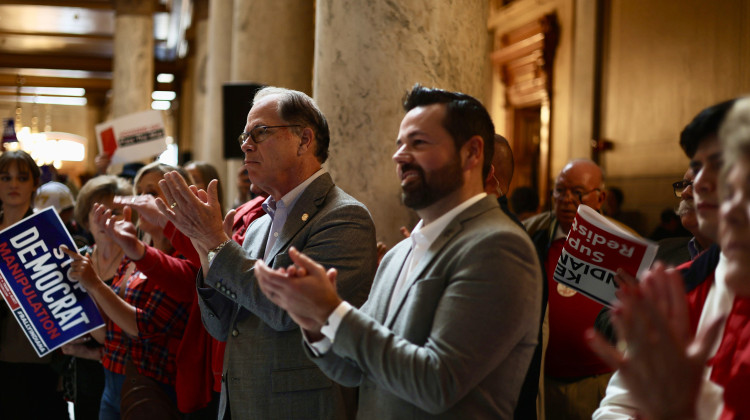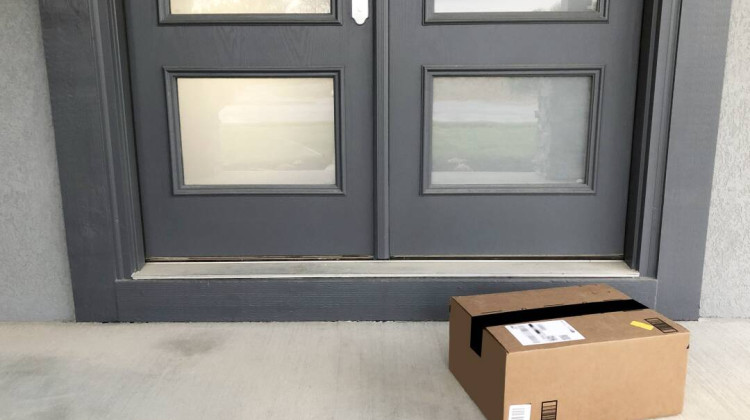RON WILKINS - Journal & Courier

Astronaut Tracy Caldwell Dyson photographed this self portrait in the Cupola module of the International Space Station observing the Earth below in during a mission in 2010. (Tracy Cladwell Dyson/NASA)
LAFAYETTE, Ind. (AP) — Hoosiers hunkering down to the confined to spaces of their homes is not unlike what Purdue professor Marshall Porterfield prepared astronauts for while he worked at NASA.
Porterfield, a Purdue University professor of agricultural and biological engineering, served five years as NASA division director for Space Life and Physical. Porterfield worked with astronauts, teaching them about living in restricted environments such as the International Space Station.
The skills are surprisingly transferable to Gov. Eric Holcomb's stay-at-home order that started March 25 because of the coronavirus emergency.
“These people really are mission oriented," Porterfield said. "They know what they’re doing has a broader interest on human impact.”
In times of social distancing and shuttered social lives, parts of life might feel meaningless. It's not.
“Collectively, the mission plan is to prevent the spread of the virus,” Porterfield said.
Meanwhile, Hoosiers abiding by Holcomb's stay-at-home order are trying to cope with confinement and isolation from offices and social interactions.
Focusing on the mission plan, as Porterfield said, not ourselves or those things — or people — that irritate us is helpful.
“It can help us cope during these times of stress," he said.
Government entities inside Tippecanoe County — and across the state — have trimmed operations to comply with Holcomb's stay-at-home order and work the mission plan of stopping the spread of COVID-19.
Can local governments eek out another month of stay-at-home?
Yes, according to Lafayette Mayor Tony Roswarski and West Lafayette Mayor John Dennis.
“As of right now, we’re ready to do this for as long as it takes," Dennis said.
Thanking those in the community for their compliance with the stay-at-home order, Roswarski said, “We’re doing a lot of different things. If we had to do this for another month, can we? Yes.”
The stay-at-home order hasn't been without its challenges.
Many essential people in the private and public sector are working from home, which poses its challenges.
Astronauts' days on the space station are scheduled and every five-minute block of time has a plan for those living and working in Earth's orbit.
“One of the things is to have a routine and maintain that routine,” Porterfield said of his advice to those working from home with kids and animals underfoot. “It’s important to maintain a schedule.”
Astronauts also have a two-hour exercise program each day, Porterfield said. The workouts serve more than just to maintain muscles in space.
“There’s a lot of evidence that being physically active helps prevent depression," he said.
If you exercise at a gym, continue the workouts at home. If you don't exercise, now is good time to start, he said.
On the space station, astronauts can't just open a hatch and take a walk. But even with the stay-at-home order, people can walk. Just remember to keep a six-foot distance between you and the people with whom you're walking, Dennis said.
“We have done as much as we can to make people aware of social distancing,” Dennis said.
Many of the cities' trails remain open, but the playground and playground equipment in parks are closed because of possible spreading of the virus, Dennis said.
He noticed over the weekend people who are familiar with friends tend to violate the social distancing guidelines and walk shoulder-to-shoulder while they talk, Dennis said.
If your walking buddy isn't someone from your household, open the distance and talk a little louder, Dennis said.
All this togetherness can wear on people living in the same house, though.
Porterfield isn't surprised. Astronauts must learn how to cope with irritating situations and personality conflicts, including children who might not have an appreciation of how important the stay-at-home order is.
Explain to the children and teens and make it a team-building experience.
“It’s important for children of any age to know what’s going on,” Porterfield said. “Help them understand why and the limitations.”
When the children and teens understand, discuss the schedules and allow them input into the decisions, he said.
Ultimately, those decisions will fall to the parents, but making the children a part of those decisions is part of building the team, Porterfield said.
And when a younger or older siblings — or parents — are on their last nerve, what then?
“Hopefully you have enough space to create a buffer zone to smooth those situations out,” Porterfield said.
While in that buffer space, it's important to reflect on the situation.
"You can’t get too self-absorbed in what’s happening to you personally," Porterfield said. "There is an end to this.
“Don’t focus on self. Focus on the mission.”
And the mission is to stop the spread of the coronavirus, in case anyone needs reminded.
 DONATE
DONATE






 Support WFYI. We can't do it without you.
Support WFYI. We can't do it without you.